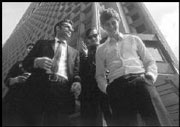INTERPOL
HEATHER DUBY, LONG WINTERS
Graceland, 381-3094, $8
9 p.m. Fri., Sept. 13
LIKE MANY NEW JERSEY teenagers of his generation, Interpol bassist Carlos D. spent his adolescence listening to heavy metal. Among his seminal influences, he names Led Zeppelin’s John Paul Jones and Clifford Lee Burton, who played bass on the first two Metallica albums before his accidental death in 1986.
Nothing shocking . . . until you pop in Interpol’s Turn On the Bright Lights (Matador). Suddenly, it’s nigh impossible to imagine young Carlos wasting away his adolescence “drinking Budweiser in some abandoned parking lot with a bunch of other metalheads,” despite his stories of doing just that. For, you see, the 11 songs on Interpol’s debut full-length have garnered critical comparisons to virtually every post-punk act imaginable. Joy Division is the most common one, due mostly to the tension and release that propel cuts like “Obstacle 1” and “Roland,” plus the taut vocal style of singer Paul B. (the band members eschew surnames), which recalls both JD’s Ian Curtis and Ian McCulloch of Echo and the Bunnymen.
But elsewhere on Bright Lights there are oceanic, layered guitars and melancholy lyrics like “I’m sick of spending these lonely nights/Training myself not to care” that echo underrated U.K. trio Kitchens of Distinction, chugging rhythms ࠬa the Smiths (“Say Hello to the Angels”), and even introspective moments that wouldn’t sound out of place on a Durutti Column album (“Hands Away”). Somehow, Interpol fuses all these elements into a glorious, unique whole.
Nowadays, Carlos cites New Order’s Peter Hook and the Cure’s Simon Gallup as players he admires. He singles out John Taylor of Duran Duran for especially high praise, because of “the way he mixed rock and disco at the same time. He’s one of the most amazing bass players ever.” Like the double-D boys, Interpol also projects a very distinctive visual image, though Carlos says that aspect of the band has more to do with a shared fashion aesthetic—lots of dark suits and skinny ties—than a calculated marketing move. “It’s not something premeditated,” claims the bassist. “But we want to dress up and look nice, and we feel comfortable in these clothes.”
Originally formed in 1998, the quartet—which also features lead guitarist Daniel K.—didn’t completely gel until two years later, when replacement drummer Sam F. joined the fold. “Literally, the best rehearsal that we’ve ever had was the first one with Sam. His style of drumming is really fierce—almost like punk rock—and he injected a force into our music that was lacking before.”
Soon the band was packing downtown New York venues, while a handful of limited-edition U.K. releases and a John Peel radio session landed them praise and tour dates on the other side of the pond. (Jarvis Cocker from Pulp even showed up at a recent London show. “He’s one of my idols,” admits Carlos. “When I heard he requested to be on the list, I thought, ‘Wow, we must be doing something right!'”) Despite having been together some four years, the group’s current cross-country trek is their first proper North American tour. Carlos, who was born in the borough of Queens and lived there till an adolescent stint in New Jersey, admits he’s glad Interpol will be on the road Sept. 11, instead of at home.
What does he hope to be missing by being in the middle of the country—somewhere on the highway between Minneapolis and Seattle, to be precise—on that grim anniversary? “A revisitation of the dark cloud of misery that hung over New York City for a week last year,” he says. “I just don’t want to have anything to do with it at all . . . not for lack of empathy with the victims or the families of victims, but it was horrible the first time. It doesn’t need to be horrible a second time.”
Not that he expects the group’s maiden U.S. adventure—which concludes Sept. 30 in Cambridge, Mass., before the band heads back to Europe—to be a carefree cakewalk, either. “I’m kind of scared about the rest stops in between certain cities,” admits the committed city dweller. “I’m probably going to see humanity in its most unflattering forms.” On a less wary note, he says the band is primarily “looking forward to seeing what the crowd reactions will be like,” since Bright Lights has been in stores since late August and the self-titled three-song single that preceded it generated plenty of early buzz.
And even though these days Carlos is more apt to pull Seven and the Ragged Tiger off his CD shelves than The Number of the Beast, he hasn’t tossed out the records he treasured during his Garden State years. “They represent a part of my life, so I don’t want to let go of them,” he insists. “The first Iron Maiden album’s still really good.”







